
THE VOICE OF INTERNATIONAL LITHUANIA
|
VilNews has its own Google archive! Type a word in the above search box to find any article.
You can also follow us on Facebook. We have two different pages. Click to open and join.
|
Featured black
Numerous warning lights – but who cares?
- Posted by - (0) Comment
We mention below three very distinct warning lights that Lithuanian authorities and control bodies should have reacted to long ago. These three are just the tip of the iceberg. There are many, many more...
WARNING LIGHT 1:

THE BRITISH FINANCIAL SERVICE USED STRONG WORDS ABOUT SNORAS BANK ALREADY 2 YEARS AGO
In 2009 the now nationalised Snoras bank applied to the British Financial Services Authority (FSA) to operate in the UK. The FSA refused permission to conduct business in the UK because the bank repeatedly gave “misleading and incomplete” answers to the regulator. These included failing to mention that it had been refused permission to take retail deposits in Russia and had been fined by the Lithuanian banking regulator. The FSA also attacked the record of Bankas Snoras’ largest shareholder and chairman of its supervisory board, Vladimir Antonov, whom it accused of withholding information. “These failures are not an isolated instance but are examples of an ongoing pattern of behaviour by institutions controlled by Mr Antonov,” the FSA said. These comments must have been known by the Lithuanian Central Bank (Lietuvos bankas) already by then. Why didn’t they react? And why didn’t Ernst & Young, Snoras’ auditor, react? The audit company is now conducting an internal investigation about its previous audits at the bank, but shouldn’t such an important investigation be done by a neutral party? We do, after all, talk about a scandal that will have a very negative impact for the economy of the country and its people…
Read more:
http://bnn-news.com/antonov-jailed-10-years-lithuania-3-years-latvia-41956
http://www.businessweek.com/news/2011-12-02/lithuania-borrowing-costs-to-surge-as-snoras-boosts-debt.html
WARNING LIGHT 2:
 The new Lithuanian parliament hall. |
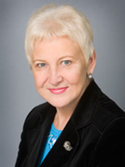 Irena Degutiene |
LITHUANIAN PARLIAMENTARIANS ARE AMONG THE BEST PAID IN THE ENTIRE EUROPEAN UNION!
BALTIC TIMES had an interesting article this week, telling that the Lithuanian parliamentarians’ 2,000 euro salary per month is at the bottom of the list of European legislator pay, but with all parliamentary allowances, benefits and salaries summed up, the entitlements skyrocket, catapulting Lithuanian legislators to a level with an average salary, on par with the very top of the best paid elected officials in the entire European Union, up to 10,000 euro per month!
“To be honest, I have never been aware of such benefits, even when I stayed at the wheel of the parliament. The Labor Party, whose deputy chairman I am now, stands for cutting down the excessive parliamentary benefits. However, I do not think this Seimas will have the guts to cut the fruitful branches it sits on,” Arturas Paulauskas, the former chairman of Naujoji Sajunga (New Union) and deputy chairman of the Labor Party presently, said to The Baltic Times.
The mid-November parliamentary deliberations over the draft on Parliamentarians’ Activity Guarantees have shown that Lithuanian legislators are far from considering any constraints on their lavish parliamentary incentives – the draft has been rejected and sent for improvements.
“I am really surprised by the legislators’ decision. Frankly, I thought the bill, upon introduction, with certain amendments and improvements would be passed. To reject it the way the parliamentarians did, walking out before the crucial vote or abstaining during the vote, means withdrawal from solving the problem. I do not know whether the politicians who voted against the bill, or simply walked out before the vote, will seek a new Seimas tenure next year. If yes, it means they are willing to further traipse in the mud we have all been stomping in so long and tediously,” Irena Degutiene, chairwoman of the Lithuanian Parliament, said with unusually strong words to express her angst.
Degutiene, nevertheless, is hopeful in bringing the revised and supplemented bill for the MPs in spring 2012. “I hope that common sense will prevail and we pass the law,” she said.
Unlike in Lithuania, in the other two Baltic countries MP salaries are recalculated every year, and politicians receive parliamentary activity compensation for transport, office, representation and professional training. In that regard, Estonia has set it such that this kind of compensation cannot exceed 30 percent of the parliamentary salary, which is 3,353 euros.
Read more:
http://www.baltictimes.com/news/articles/30094/
WARNING LIGHT 3:
 |
 |
LITHUANIA HAS NOW EU’S WIDEST WEALTH GAP AND HIGHEST POVERTY RISK
Lithuania’s austerity measures, which are similar in size to those facing Greece, boosted income inequality to the widest in the European Union.
The CHART OF THE DAY in a BLOOMBERG article this week shows how the proportion of people at risk of poverty in Lithuania surged to the highest level among the bloc’s 27 members after state spending was cut. The lower panel shows the gap between the nation’s highest and lowest earners is the EU’s widest after budget savings hurt the poor.
Lithuania implemented austerity measures equal to 12 percent of gross domestic product in 2009-2010. Pension cuts may be reversed after the economy grew 6.7 percent in the third quarter, the second-fastest pace in the EU. Greece, where GDP contracted 5.2 percent in the same period, is in the midst of budget cuts worth 16 percent of economic output, data from the International Monetary Fund show.
“The blow was very painful to the poor,” said Vilija Tauraite, an economist for SEB Bank in the capital, Vilnius. “Lithuania’s fiscal discipline has been extremely severe in the past three years and it’s now crucial to ease the burden because these people are hanging on the precipice of poverty. Their quality of life is far worse than the situation of pensioners in southern Europe.”
- Bookmark :
- Digg
- del.icio.us
- Stumbleupon
- Redit it
Numerous warning lights – but who cares?
- Posted by - (1) Comment
We mention below three very distinct warning lights that Lithuanian authorities and control bodies should have reacted to long ago. These three are just the tip of the iceberg. There are many, many more...
WARNING LIGHT 1:

THE BRITISH FINANCIAL SERVICE USED STRONG WORDS ABOUT SNORAS BANK ALREADY 2 YEARS AGO
In 2009 the now nationalised Snoras bank applied to the British Financial Services Authority (FSA) to operate in the UK. The FSA refused permission to conduct business in the UK because the bank repeatedly gave “misleading and incomplete” answers to the regulator. These included failing to mention that it had been refused permission to take retail deposits in Russia and had been fined by the Lithuanian banking regulator. The FSA also attacked the record of Bankas Snoras’ largest shareholder and chairman of its supervisory board, Vladimir Antonov, whom it accused of withholding information. “These failures are not an isolated instance but are examples of an ongoing pattern of behaviour by institutions controlled by Mr Antonov,” the FSA said. These comments must have been known by the Lithuanian Central Bank (Lietuvos bankas) already by then. Why didn’t they react? And why didn’t Ernst & Young, Snoras’ auditor, react? The audit company is now conducting an internal investigation about its previous audits at the bank, but shouldn’t such an important investigation be done by a neutral party? We do, after all, talk about a scandal that will have a very negative impact for the economy of the country and its people…
Read more:
http://bnn-news.com/antonov-jailed-10-years-lithuania-3-years-latvia-41956
http://www.businessweek.com/news/2011-12-02/lithuania-borrowing-costs-to-surge-as-snoras-boosts-debt.html
WARNING LIGHT 2:
 The new Lithuanian parliament hall. |
 Irena Degutiene |
LITHUANIAN PARLIAMENTARIANS ARE AMONG THE BEST PAID IN THE ENTIRE EUROPEAN UNION!
BALTIC TIMES had an interesting article this week, telling that the Lithuanian parliamentarians’ 2,000 euro salary per month is at the bottom of the list of European legislator pay, but with all parliamentary allowances, benefits and salaries summed up, the entitlements skyrocket, catapulting Lithuanian legislators to a level with an average salary, on par with the very top of the best paid elected officials in the entire European Union, up to 10,000 euro per month!
“To be honest, I have never been aware of such benefits, even when I stayed at the wheel of the parliament. The Labor Party, whose deputy chairman I am now, stands for cutting down the excessive parliamentary benefits. However, I do not think this Seimas will have the guts to cut the fruitful branches it sits on,” Arturas Paulauskas, the former chairman of Naujoji Sajunga (New Union) and deputy chairman of the Labor Party presently, said to The Baltic Times.
The mid-November parliamentary deliberations over the draft on Parliamentarians’ Activity Guarantees have shown that Lithuanian legislators are far from considering any constraints on their lavish parliamentary incentives – the draft has been rejected and sent for improvements.
“I am really surprised by the legislators’ decision. Frankly, I thought the bill, upon introduction, with certain amendments and improvements would be passed. To reject it the way the parliamentarians did, walking out before the crucial vote or abstaining during the vote, means withdrawal from solving the problem. I do not know whether the politicians who voted against the bill, or simply walked out before the vote, will seek a new Seimas tenure next year. If yes, it means they are willing to further traipse in the mud we have all been stomping in so long and tediously,” Irena Degutiene, chairwoman of the Lithuanian Parliament, said with unusually strong words to express her angst.
Degutiene, nevertheless, is hopeful in bringing the revised and supplemented bill for the MPs in spring 2012. “I hope that common sense will prevail and we pass the law,” she said.
Unlike in Lithuania, in the other two Baltic countries MP salaries are recalculated every year, and politicians receive parliamentary activity compensation for transport, office, representation and professional training. In that regard, Estonia has set it such that this kind of compensation cannot exceed 30 percent of the parliamentary salary, which is 3,353 euros.
Read more:
http://www.baltictimes.com/news/articles/30094/
WARNING LIGHT 3:
 |
 |
LITHUANIA HAS NOW EU’S WIDEST WEALTH GAP AND HIGHEST POVERTY RISK
Lithuania’s austerity measures, which are similar in size to those facing Greece, boosted income inequality to the widest in the European Union.
The CHART OF THE DAY in a BLOOMBERG article this week shows how the proportion of people at risk of poverty in Lithuania surged to the highest level among the bloc’s 27 members after state spending was cut. The lower panel shows the gap between the nation’s highest and lowest earners is the EU’s widest after budget savings hurt the poor.
Lithuania implemented austerity measures equal to 12 percent of gross domestic product in 2009-2010. Pension cuts may be reversed after the economy grew 6.7 percent in the third quarter, the second-fastest pace in the EU. Greece, where GDP contracted 5.2 percent in the same period, is in the midst of budget cuts worth 16 percent of economic output, data from the International Monetary Fund show.
“The blow was very painful to the poor,” said Vilija Tauraite, an economist for SEB Bank in the capital, Vilnius. “Lithuania’s fiscal discipline has been extremely severe in the past three years and it’s now crucial to ease the burden because these people are hanging on the precipice of poverty. Their quality of life is far worse than the situation of pensioners in southern Europe.”
- Bookmark :
- Digg
- del.icio.us
- Stumbleupon
- Redit it
- Posted by - (0) Comment
Advent 1945:
|
IN THE WORLD
“Across America, people crowd churches praying with gratitude for the peace in place, and reach out to wounded veterans, children who lost fathers, and neighbors who lost sons. Americans in big cities and small, participate in displays of the intrinsic love so indicative of the American spirit.” |
IN LITHUANIA
In 1944-45 Lithuanians were forced to realize that the bloody World War II had been replaced by a new war, the longest and bloodiest guerrilla war in modern European history, lasting from 1944 to at least 1953. |
Advent and Christmas of 1945 was over most of the world celebrated with a joy and delight almost never before seen. Young and old gathered in homes, on streets and in churches. An endless series of victory ceremonies took place in almost every corner of the world. With a deep sense of joy and gratitude all wanted each other warm, comfortable and relaxing Christmas holidays, knowing that the Nazi era was over and that the world now more than ever could look forward to a future of peace and prosperity. The war had finally released the grip, forgotten was the economic recession of the 1930s. Forgotten was also our Western World’s close friends and neighbours - the Baltic States.
On a small farm in northern Lithuania, in the outskirts of the village Šilagalis, Christmas 1945 is nearing. It is the 22nd of December, and the mother of the house feels very happy that her 21 year old son Povilas has finally come home to visit after having been away for many months.
- Bookmark :
- Digg
- del.icio.us
- Stumbleupon
- Redit it
- Posted by - (0) Comment
Chinese-Lithuanian
IT Innovation Centre a
step in right direction!
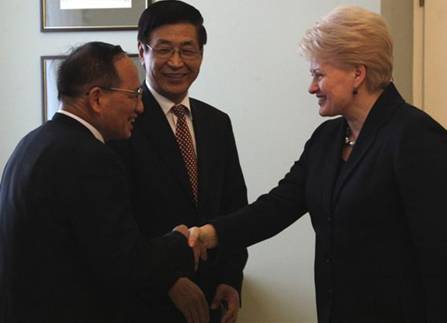
President Dalia Grybauskaitė with Vice Presidents Qu Wenchu and Lu Yong of the Chinese IT giant "Huawei" - to discuss cooperation and investments in the sphere of innovations. The President said the cooperation with "Huawei", is already yielding mutually beneficial results. Vilnius University, "Omnitel" and "Huawei" this week opened an information technologies research laboratory which they believe will become a centre of innovations for the Baltic countries and Eastern Europe.
Text: Aage Myhre, Editor-in-Chief
aage.myhre@VilNews.com
There has been expressed skepticism about some of the so-called foreign investments (FDIs) that have taken place in this country over the past two-three years, as they largely have been paid by Lithuania itself, meaning the country's tax payers, partly as a hollow play to the gallery with the intention of putting the government's results in this field in better light. This week's announced partnership with China appears different. More pragmatic, real and sustainable. I consider the new Chinese-Lithuanian IT Innovation Centre at Vilnius University a step in the right direction!
Lithuania should create more 'basketball business'
The cooperation with China started when Lithuania’s “Omnitel”, the leading Baltic telecommunication company, owned by Scandinavian TeliaSonera, invited Chinese “Huawei”, a leading global information and communications technology (ICT) solutions provider, to a cooperation with the aim to extend Omnitel’s network ahead of the European basketball championship (EuroBasket 2011) that took place in Lithuania earlier this autumn. The cooperation led to the successful deployment of a commercial 1800MHz LTE network for Omnitel to serve the championship.
Omnitel had long been planning an upgrade to its existing network in order to meet increasing data demands, and in May of this year, Huawei was exclusively awarded the Omnitel contract for LTE deployment and GSM/UMTS radio access networks expansion across all of Lithuania.
At EuroBasket 2011, Huawei provided Omnitel with its world-leading Single RAN LTE solution as well as with radio access and transmission networks. As a result, the LTE network was able to achieve downlink speeds of 85Mb/s, making it the fastest mobile broadband network in Lithuania.
The excellent performance of the LTE network during EuroBasket 2011 was an important step in the commercialization process of the Baltic region’s mobile broadband network.
Basketball is known as Lithuania's second religion (after Catholicism). The collaboration between Omnitel and Huawei shows that it also can lead to business and development cooperation. This week's IT Innovation Centre is a tangible proof of that. So why not think more in this direction? There is probably much more of business and FDIs that can be created around the national sport…
The President plays well with business and science!
"Lithuania is among the leading players in the European IT and telecom market. We have not only the most advanced infrastructure but also highly qualified professionals. "Huawei" is one of the most innovative companies in the world. Cooperation with this company will serve to promote more rapid development of innovations as it will open new possibilities in the global IT market," President Dalia Grybauskaitė said at a meeting with the Chinese delegation in Vilnius this week.
The President during her visit to China in October last year participated in the Shanghai World EXPO and agreed with representatives of "Huawei" to organize the training course for Lithuanian students in this company and to establish an information technologies research centre in Lithuania.
In July, ten IT students from Kaunas University of Technology, Vilnius Gediminas Technical University and Vytautas Magnus University already underwent a training course in the Chinese company. This week Vilnius University, "Omnitel" and "Huawei" open in Vilnius a research centre of information technologies the activities of which will include the implementation of research programs, traineeships for researchers, and the development of modern technologies.
Dalia Grybauskaitė also stressed the importance of economic cooperation between Lithuania and China. The shuttle train "Saulė", which was launched last month, connecting China, Kazakhstan and Lithuania, should enhance the bilateral business relations even more, she said.
The President plays truly well with the business and the scientists in this case. That bodes well for a better and more advanced ‘Lithuania of the future’!

In May this year an initial agreement for the establishing of a joint research laboratory at Vilnius University was signed between (L/R) Antanas Zabulis, President of „Omnitel“, Professor Benediktas Juodka, Rector of Vilnius University and Ye Yong, Country Manager for the Baltics of „Huawei Technologies Co”.
To read more, go to our
SECTION 18 – EDUCATION, RESEARCH & DEVELOPMENT
- Bookmark :
- Digg
- del.icio.us
- Stumbleupon
- Redit it
- Posted by - (3) Comment
Chinese-Lithuanian
IT Innovation Centre a
step in right direction!
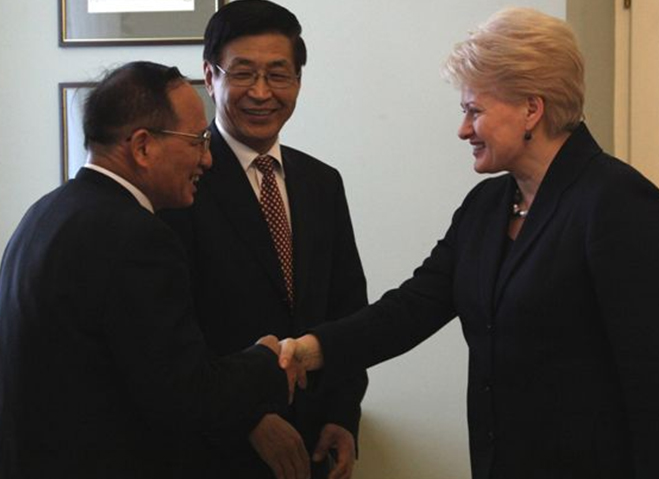
President Dalia Grybauskaitė with Vice Presidents Qu Wenchu and Lu Yong of the Chinese IT giant "Huawei" - to discuss cooperation and investments in the sphere of innovations. The President said the cooperation with "Huawei", is already yielding mutually beneficial results. Vilnius University, "Omnitel" and "Huawei" this week opened an information technologies research laboratory which they believe will become a centre of innovations for the Baltic countries and Eastern Europe.
Text: Aage Myhre, Editor-in-Chief
aage.myhre@VilNews.com
There has been expressed skepticism about some of the so-called foreign investments (FDIs) that have taken place in this country over the past two-three years, as they largely have been paid by Lithuania itself, meaning the country's tax payers, partly as a hollow play to the gallery with the intention of putting the government's results in this field in better light.
This week's announced partnership with China appears different. More pragmatic, real and sustainable. I consider the new Chinese-Lithuanian IT Innovation Centre at Vilnius University a step in the right direction!
Lithuania should create more 'basketball business'
The cooperation with China started when Lithuania’s “Omnitel”, the leading Baltic telecommunication company, owned by Scandinavian TeliaSonera, invited Chinese “Huawei”, a leading global information and communications technology (ICT) solutions provider, to a cooperation with the aim to extend Omnitel’s network ahead of the European basketball championship (EuroBasket.2011) that took place in Lithuania earlier this autumn. The cooperation led to the successful deployment of a commercial 1800MHz LTE network for Omnitel to serve the championship.
Omnitel had long been planning an upgrade to its existing network in order to meet increasing data demands, and in May of this year, Huawei was exclusively awarded the Omnitel contract for LTE deployment and GSM/UMTS radio access networks expansion across all of Lithuania.
At EuroBasket 2011, Huawei provided Omnitel with its world-leading Single RAN LTE solution as well as with radio access and transmission networks. As a result, the LTE network was able to achieve downlink speeds of 85Mb/s, making it the fastest mobile broadband network in Lithuania.
The excellent performance of the LTE network during EuroBasket 2011 was an important step in the commercialization process of the Baltic region’s mobile broadband network.
Basketball is known as Lithuania's second religion (after Catholicism). The collaboration between Omnitel and Huawei shows that it also can lead to business and development cooperation. This week's IT Innovation Centre is a tangible proof of that. So why not think more in this direction? There is probably much more of business and FDIs that can be created around the national sport…
The President plays well with business and science!
"Lithuania is among the leading players in the European IT and telecom market. We have not only the most advanced infrastructure but also highly qualified professionals. "Huawei" is one of the most innovative companies in the world. Cooperation with this company will serve to promote more rapid development of innovations as it will open new possibilities in the global IT market," President Dalia Grybauskaitė said at a meeting with the Chinese delegation in Vilnius this week.
The President during her visit to China in October last year participated in the Shanghai World EXPO and agreed with representatives of "Huawei" to organize the training course for Lithuanian students in this company and to establish an information technologies research centre in Lithuania.
In July, ten IT students from Kaunas University of Technology, Vilnius Gediminas Technical University and Vytautas Magnus University underwent a training course in the Chinese company. This week Vilnius University, "Omnitel" and "Huawei" opened in Vilnius a research centre of information technologies the activities of which will include the implementation of research programmes, traineeships for researchers, and the development of modern technologies.
Dalia Grybauskaitė also stressed the importance of economic cooperation between Lithuania and China. The shuttle train "Saulė", which was launched last month, connecting China, Kazakhstan and Lithuania, should enhance the bilateral business relations even more, she said.
The President plays truly well with the business and the scientists in this case. That bodes well for a better and more advanced ‘Lithuania of the future’!

In May this year an initial agreement for the establishing of a joint research laboratory at Vilnius University was signed between (L/R) Antanas Zabulis, President of „Omnitel“, Professor Benediktas Juodka, Rector of Vilnius University and Ye Yong, Country Manager for the Baltics of „Huawei Technologies Co”.
- Bookmark :
- Digg
- del.icio.us
- Stumbleupon
- Redit it
- Posted by - (0) Comment

A future of green life and energy for Lithuania?

In the German city of Freiburg environment and economy are not antagonists. On the contrary, the environmental economy is the leading business sector in both town and region.
- Bookmark :
- Digg
- del.icio.us
- Stumbleupon
- Redit it
- Posted by - (1) Comment

A future of green life and energy for Lithuania?

In the German city of Freiburg environment and economy are not antagonists. On the contrary, the environmental economy is the leading business sector in both town and region.
The town Freiburg in South-West Germany is the home of solar technology pioneers. The sunny university town has been writing solar success stories for more than 30 years. Maybe something similar could be done in Lithuania?
The view on one side of Freiburg takes you to Schlierberg; on the other, it stretches as far as the meadows and forests of Schönberg. On top of this long office and shop building in Merzhauserstrasse, solar architect Rolf Disch has built a number of penthouses. They aren’t normal penthouses. Barbara Schweer, who has now lived in one of the houses for two years with her husband Martin Hoyer and their daughter, produces some impressive energy figures: the family need less than 4,000 kilowatt hours a year for heating and hot water, which corresponds to the heating value of less than 400 litres of oil.
The heat is piped in from a nearby wood-fired power plant. “In the first year we only had heating costs of 300 euros,” says Schweer. That is really an achievement in a house with 167 square metres of living space. Optimal heat insulation is part of the recipe for success. Even on January days when temperatures fall to around freezing point, the house often doesn’t need any heating once the sun comes out from behind the clouds for a while. That’s because the south-facing glass façade captures the oblique winter sunlight, while later in the year the high summer sun is prevented from shining directly into the rooms – the house has been very intelligently designed. And the family all agree that the interior climate is ideal inside a building that contains large amounts of wood.
“Plus Energy House” is the name Architect Rolf Disch uses to describe the building, because over the year it produces more energy than its inhabitants consume. The solar electricity generating unit on the roof feeds nearly 9,000 kilowatt hours of electricity a year into the grid. If you deduct the family’s own electricity needs as well as the heating energy they use, you’re left with an annual surplus of some 2,000 kilowatt hours. That’s also well worth it financially: the monthly costs of just under 100 euros for electricity and heating are offset by income of almost 400 euros from the solar generator. Architect Disch speaks self-confidently of a “monthly energy income” and prophesies: “Additional costs for housing will eventually be transformed into additional income.” Disch has already built 47 of these plus energy houses at the foot of the Schlierberg in Freiburg – some as penthouses, some as terraced houses.
Not far away stands the Heliotrop – yet another innovation from Disch’s office. It is a revolving solar house that follows the sun, thereby enabling it to draw the maximum benefit from the incoming rays. It was the first plus energy house in Germany and is now one of Freiburg’s most frequently visited solar projects.
Freiburg really doesn’t have any shortage of solar innovations. They also include the solar factory. During the mid-1990s, when the future of the solar industry in Germany was still rather uncertain, Georg Salvamoser boldly founded a solar module factory in Freiburg and was able to celebrate the nationwide launch of a highly promising industry in February 1996. Although other German solar firms overtook it long ago in terms of size, Freiburg im Breisgau can still claim it was the pioneer – as is so often the case when innovations in the solar energy field are concerned.
The main pacesetter for Freiburg’s solar progress is the Fraunhofer Institute for Solar Energy Systems (ISE). With a total of over 500 employees and more than 18,000 square metres of offices, laboratories and test areas, the ISE is today the largest solar research institution in Europe. The Fraunhofer Institute is also so successful because the staff here steadfastly maintained their belief that solar energy would eventually make a breakthrough. The new institute building, which was only opened in autumn 2001, soon became too small again and some of the scientists and equipment have already moved to the neighbouring building and the Solar Info Center (SIC).
The SIC is another highlight of Solar City Freiburg: the modern building near Freiburg’s exhibition and conference centre is considered a nationwide competence centre for the solar industry. Its 14,000 square metres of space allow various firms to work together under one roof in a variety of different ways on the subjects of renewable energy, solar construction and energy-efficiency. The spectrum ranges from one-person firms with 20 square metres of office space to large, internationally renowned businesses.
One of these is Concentrix Solar, a company that was founded in 2005 as a spin-off from the ISE. Since February 2006, Good Energies, one of the leading strategic investors in the field of renewable energies, has held a stake in the young firm that produces concentrator power plants for sunny locations. An optical system consisting of Fresnel lenses, very thin lenses, concentrates the sunlight onto a small high-performance solar cell. These solar cells transform the light, which has been concentrated almost 500 times, directly into electrical energy. Using its Flatcon® technology, Concentrix was the first company to develop a terrestrial application for the high-efficiency solar cells that had previously only been used in space.
Today these solar cells already achieve excellent efficiency rates of 35%. “By using high-efficiency solar cells, the concentration of light and high precision in positioning the solar cells, Concentrix realizes module efficiency levels of more than 26%,” says CEO Hansjörg Lerchenmüller. Compared to conventional silicon technology, Concentrix has been able to almost double the all-important module efficiency. Concentrix is now regarded nationwide as a highly innovative solar specialist – and a solar success story. Only recently, at the beginning of 2008, the company was honoured with the Innovation Award of the German Economy. The new modules will now also be produced in Freiburg from the middle of 2008, which is considered a success for the solar city, because other regions had made strong attempts to attract the innovative solar specialists from Freiburg.
Yet this is by no means the end of the list of Freiburg’s solar projects. For example, no other German city is more committed to advancing solar climatization, and Freiburg offers not one, but two pilot projects in this area: at the Chamber of Industry and Commerce (IHK) building and the university hospital. Furthermore, for many years now Freiburg with its 200,000 inhabitants has been at the top of the “Solarbundesliga”, the ranking of solar energy use in German towns and cities.
Although in the harsh reality of professional soccer SC Freiburg may only play in the second division, even in its struggle for goals and points it fulfills its solar obligations. Some 2,200 square metres of photovoltaic cells on the roof of the Dreisam Stadium generate roughly two million kilowatt hours of solar electricity a year. In combination with the environmentally friendly Stirling engines that form part of its heating strategy, SC Freiburg generates more than half of its entire electricity needs itself – emission-free.
Why has solar energy developed in such an exemplary way in Freiburg? Why are there so many innovative solar projects here? Perhaps because the city is located in one of Germany’s sunniest regions. Perhaps also because solar energy has always been linked in Freiburg with the image of “green”, ecological quality of life. Most probably, however, the main impetus came from events that occurred over three decades ago: in the 1970s there were plans to build a nuclear power station before the gates of Freiburg in Wyhl on the Kaiserstuhl. But the people of the region opposed it and thousands of them occupied the construction site in February 1975. Eventually they were able to prevent the building of the reactor after years of political campaigning.
However, the campaigners did not stop at protest, they also developed ecological alternatives. Only a year after the occupation of the construction site, a first solar energy fair was held in the nearby wine-growing municipality of Breisach. That represented the birth of Solar City Freiburg. Today more than 10,000 people in Freiburg work in the environmental and solar sectors explains Bernd Dallmann, Freiburg’s economic development specialist, who is still working hard to enhance the city’s green image. In fact, a few weeks ago, Freiburg decided to call itself a “Green City” – bright prospects indeed for the solar city at the foot of the Black Forest.
Based on an article by Bernward Janzing,
http://www.magazin-deutschland.de
- Bookmark :
- Digg
- del.icio.us
- Stumbleupon
- Redit it
- Posted by - (3) Comment
The land of smiles
or tears?
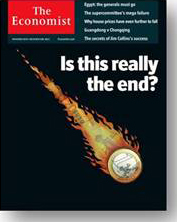 The Economist’s (London) image shows the euro as an asteroid, plummeting to earth. |
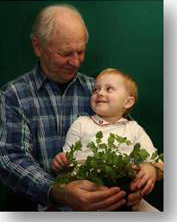 The editor's photo was meant to illustrate that humanity has a bright future ahead. |
In the recent issue of VilNews I wrote that I do not share the pessimists gloomy predictions for the world's future, as I think the crisis is part of a necessary cleansing process. I am optimistic because I see that a whole new type of people is coming. New leaders. Many of today's children and young people.
What I see is forward-looking youngsters with good balance within themselves and their 'other dimension'; their divine origin.
I believe that ‘The land of smiles’ is under development. That new kids, a new human type, seem to have come to Earth with a special mission: to assist the Earth and its inhabitants in the transition and the 'rebirth' as a planet with higher awareness and better interpersonal understanding.
Aage Myhre
Editor-in-Chief
You are all welcome to participate in this discussion!
 |
Many believe that we will be entering the Age of Enlightenment within the next five years… Others believe that we have already begun to make this transition The time has come for us to move past the illusion of separateness Rather than judge one another, we teach our clients to go beneath the surface of a behavior that differed from their own to find deeper meaning. This led to under-standing and acceptance, more productive negotiations and perhaps even a shared knowing. When leaders and citizens remember to appreciate the Three Points of Connection, everything else will fall into place. We will know, from deep within, that to care for our environment is not only a privilege but natural because as we care for the earth we care for ourselves. We will know that going beyond boundaries of difference and age-old conflict enables us to make peace with our neighbors and co-create a world where children live happily and healthfully. And, when we return to source as the partner in creating our world, we will not falter in our ability to move towards a positive future that is inclusive of all sentient beings, as the great mystical traditions teach. Gather small groups in your organization and begin to listen deeply to each other. Better yet, take a walk outside and commune with Nature. Give thanks for the beauty that surrounds you and take time to smell the roses. All things will go smoother from there. Jurate Kutkus Burns, Florida. |
 |
You brighten up my day A very interesting article with a lot of insight regarding divinity and where we are heading, in this cosmic time of transmission to the age of Aquarius! You brighten up my day with very positive forecast. Hans Gyllenhammar, Swedish Ministry for Foreign Affairs. |
 |
The next generation will have a healthier more sustainable future because of the massive restructuring and pain we will have to endure in this past generation |
 |
We fear that without urgent action by the ECB, the euro will crash, doing untold damage not just to Europe but to the entire world economy Denial is not just a river in Egypt! Dr. Val Samonis, |
- Bookmark :
- Digg
- del.icio.us
- Stumbleupon
- Redit it
The land of smiles
- Posted by - (0) Comment

My youngest daughter, then three-year-old Cornelia, with granddad Bruno.
I think people on mother Earth has bright times to look forward to;
times when the world will be managed and developed by the
new type of people, those who are now growing up.
Photo: Aage Myhre.
By Aage Myhre
aage.myhre@VilNews.com
The economic downturn has made more and more ‘experts’ come forward with gloomy predictions for the world's future.
I do not share this pessimistic attitude. I think the crisis is part of a necessary cleansing process. In this way, we live in a very exciting time. The very ‘transition time’.
I think the world’s money power and capitalism as it has been exercised is bad and unfair in many ways. I am skeptical also about many of the other 'isms'. In my opinion, greed and desire for power have defined the various 'isms' and the world for far too long.
Many of the problems they have created have been nurtured by unhealthy egoism. Money has become our god, a deceitful god. Therefore, many countries are struggling today. Many innocent people suffer as a result thereof.
Yet I am optimistic. For I see that a whole new type of people is coming. New leaders. Many of today's children and young people. What I see is forward-looking youngsters with good balance within themselves and their 'other dimension'; their divine origin.
‘The land of smiles’ is under development. The new kids, the new human type, seem to have come to Earth with a special mission: to assist the Earth and its inhabitants in the transition and the 'rebirth' as a planet with higher awareness and better interpersonal understanding.
All truth passes through three stages. First, it is ridiculed. Second, it is violently opposed. Third, it is accepted as being self-evident.
- Arthur Schopenhauer, Germantown philosopher (1788 - 1860).
- Bookmark :
- Digg
- del.icio.us
- Stumbleupon
- Redit it
The land of smiles
- Posted by - (2) Comment

My youngest daughter, then three-year-old Cornelia, with granddad Bruno.
I think people on mother Earth has bright times to look forward to;
times when the world will be managed and developed by the
new type of people, those who are now growing up.
Photo: Aage Myhre.
By Aage Myhre
aage.myhre@VilNews.com
The economic downturn has made more and more ‘experts’ come forward with gloomy predictions for the world's future.
I do not share this pessimistic attitude. I think the crisis is part of a necessary cleansing process. In this way, we live in a very exciting time. The very ‘transition time’.
I think the world’s money power and capitalism as it has been exercised is bad and unfair in many ways. I am skeptical also about many of the other 'isms'. In my opinion, greed and desire for power have defined the various 'isms' and the world for far too long.
Many of the problems they have created have been nurtured by unhealthy egoism. Money has become our god, a deceitful god. Therefore, many countries are struggling today. Many innocent people suffer as a result thereof.
Yet I am optimistic. For I see that a whole new type of people is coming. New leaders. Many of today's children and young people. What I see is forward-looking youngsters with good balance within themselves and their 'other dimension'; their divine origin.
‘The land of smiles’ is under development. The new kids, the new human type, seem to have come to Earth with a special mission: to assist the Earth and its inhabitants in the transition and the 'rebirth' as a planet with higher awareness and better interpersonal understanding.
I feel that these children already understand that today's materialism is not the answer. Some of them seem to have access to gifts of clairvoyance and communication at higher levels.
These children are born with a high degree of natural intelligence, sensitivity and vision. They are creative, and often have easy access to both the left and right brain halves, making them artistically gifted, but also technologically competent and adventurous. As if they represent the universal consciousness.
A very significant aspect of this evolutionary development is that new-people do not keep their abilities and qualities for themselves. It is as if they have come to the planet to share their innate wisdom with others.
I believe that they, by their very presence, will help a lot to experience and understand these new 'vibrations' and thus open up more of their own abilities and potential.
One of the gifts the ‘new-people’ seem to bring with them during this transitional period, is that even today’s people become more aware of who they really are. The inner, the spiritual is already becoming more apparent.
So far in human history, it appears that our physical forms have locked us inside ourselves. The much finer vibrations of higher dimensions have somehow never been let out in free expression. It has always been a gap, a wall, between the material manifestation of the human body and the higher consciousness we all have inside us.
Now a new state, new openness, a new freedom is on its way. In the new situation, many will gain easier access to both material and spiritual 'realms'. It will no longer be as great a need for meditation or concentration, since access to the spirit world is becoming so much more open.
Fear, anxiety, aggression, envy, slander, arrogance, greed and distrust as we know them in today's society will slowly fade away. They will no longer plague mankind.
The new folks will fully understand and be very conscious of own strength and creativity. On who they are. They will be aware that they are different from present days’ people. They will also be confident in themselves, without being haughty or arrogant.
In the first phase of the transformation period, they will increasingly be exposed to insult and aggression from the old folks, but that would worry them little. They are very conscious of where they come from and what mission they have in the creation of the new world.
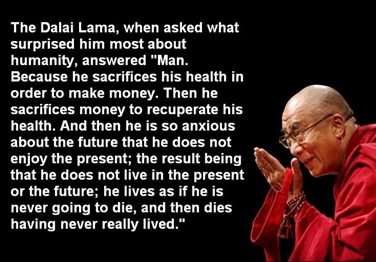
Dalai Lama's words above describe well our today’s problem. Our lives revolve around money. We do not have the time for or understanding of ourselves and our loved ones. We are not aware of who we are. And because of this lack of awareness, we, the people, have created a planet of sorrow, suffering and stress.
The constant pursuit of money does not let individuals to prioritize their own thoughts, feelings and actions. Fear of not surviving due to lack of resources has led to greed and imbalances. There is much that must be corrected if we are to make a planet where all people are satisfied and happy. But it seems that more and more feel and understand this now.
The new generation of people will find solutions to problems in a whole new way. Our days’ tendency to think in tunnels will be replaced by free thoughts, more creativity. Monetary systems will be replaced by more equitable earnings and distribution models. Greed cultures will evaporate.
Our time’s great advances in information technology have made it incredibly easy to collect and acquire knowledge. The new time will clearly demonstrate how all of this information can best be applied to the progress of humanity. Knowledge will no longer be enough, now it’s time for implementation and action.
The future will be integral. Brain halves and the human spirit will play together as never before. Individuals will find it easier to find their places in a larger whole. New plans will be developed in accordance with the holistic view lines. Two plus two is more than four in the right context.
Within my field, architecture, the new architects and site planners will far better understand that all elements must play together holistically. The new communities being developed will follow the old days of village thinking. It will be developed neighborhoods where people take care of each other. The workplace, school, residential, cultural and recreational activities will be located near each other. Segregation will be replaced by multifunctional communities. Cars will largely be redundant.
Experts from the present, past, will at first have difficulty understanding what is happening. But they will soon see that the old models no longer work. New people will take over their positions, but in an integral, non-selfish way.
Humanity has much wisdom to look forward to in the land of smiles. I think.
All truth passes through three stages. First, it is ridiculed. Second, it is violently opposed. Third, it is accepted as being self-evident.
- Arthur Schopenhauer, Germantown philosopher (1788 - 1860).
- Bookmark :
- Digg
- del.icio.us
- Stumbleupon
- Redit it
Thanksgiving
- Posted by - (1) Comment

The chess game that Pedro’s father made by his own hands.
Photo: Aage Myhre.
My friend, a journalist with the name Pedro, from Chile, gave me this chess game in 1987. At the end of the 1970s he had become victim of the military rule of Dictator Augusto Pinochet in his home country. Pedro had written some slightly critical comments about the General in his newspaper, and was given 24 hours to disappear out of Chile. The chess game was the only thing he brought with him in the backpack, except the bare necessities of clothing and food. It was his father who had carved the beautiful pieces out of wooden blocks, and the game was, therefore, the dearest object Pedro owned. He had over some time come to live in political asylum in Norway and had lived in Oslo for a few years when I met him. After a time of acquaintance he gave the chess game to me. He explained the reason: "You are the first and only Norwegian I have been able to communicate with, the only one who has shown me respect and interest since I came here."
The chess game I got from Pedro is standing here, next to me. Just to look at it makes me think. I think of a father who sat for months and cut out each individual shape very accurately and carefully from pieces of wood he had collected. I know that Pedro had been seeking asylum in Norway because he had told the truth about the abuser Pinochet. I know he spent several years in Norway without being met with genuine interest and love. The fact that my nation’s people, so quick and clever when it comes to aid and support of other peoples, not always is very good at communicating face-to-face with people who desperately need someone to talk to.
I'm glad I could play a role in Pedro's life. I am very grateful for the gift he gave me. The dearest object Pedro owned has become extremely dear to me. For all that it represents and communicates.
Thanksgiving Day is Thursday 24 November
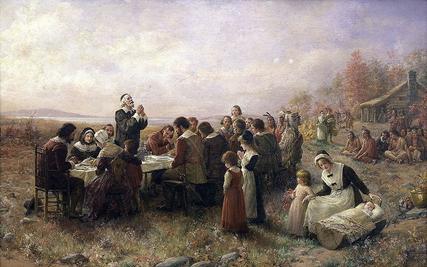
The First Thanksgiving at Plymouth.
By Jennie A. Brownscombe. (1914).
- Bookmark :
- Digg
- del.icio.us
- Stumbleupon
- Redit it
Thanksgiving
- Posted by - (1) Comment
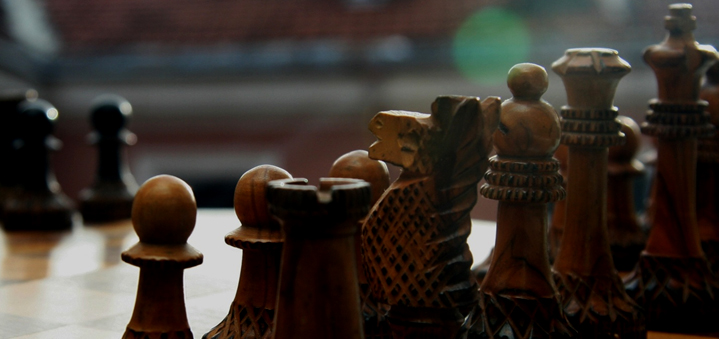
The chess game that Pedro’s father made by his own hands.
Photo: Aage Myhre.
My friend, a journalist with the name Pedro, from Chile, gave me this chess game in 1987. At the end of the 1970s he had become victim of the military rule of Dictator Augusto Pinochet in his home country. Pedro had written some slightly critical comments about the General in his newspaper, and was given 24 hours to disappear out of Chile. The chess game was the only thing he brought with him in the backpack, except the bare necessities of clothing and food. It was his father who had carved the beautiful pieces out of wooden blocks, and the game was, therefore, the dearest object Pedro owned. He had over some time come to live in political asylum in Norway and had lived in Oslo for a few years when I met him. After a time of acquaintance he gave the chess game to me. He explained the reason: "You are the first and only Norwegian I have been able to communicate with, the only one who has shown me respect and interest since I came here."
The chess game I got from Pedro is standing here, next to me. Just to look at it makes me think. I think of a father who sat for months and cut out each individual shape very accurately and carefully from pieces of wood he had collected. I know that Pedro had been seeking asylum in Norway because he had told the truth about the abuser Pinochet. I know he spent several years in Norway without being met with genuine interest and love. The fact that my nation’s people, so quick and clever when it comes to aid and support of other peoples, not always is very good at communicating face-to-face with people who desperately need someone to talk to.
I'm glad I could play a role in Pedro's life. I am very grateful for the gift he gave me. The dearest object Pedro owned has become extremely dear to me. For all that it represents and communicates.
Thanksgiving Day is Thursday 24 November
Thanksgiving or Thanksgiving Day, is a holiday celebrated in the United States on the fourth Thursday in November. It has officially been an annual tradition since 1863, when during the Civil War, President Abraham Lincoln proclaimed a national day of thanksgiving to be celebrated on Thursday, November 26. As a federal and popular holiday in the U.S., Thanksgiving is one of the major holidays of the year. Together with Christmas and the New Year, Thanksgiving is a part of the broader holiday season.
The event that Americans commonly call the "First Thanksgiving" was celebrated to give thanks to God for guiding them safely to the New World. The first Thanksgiving feast lasted three days, providing enough food for 13 Pilgrims and 90 Native Americans. The feast consisted of fish (cod, eels, and bass) and shellfish (clams, lobster, and mussels), wild fowl (ducks, geese, swans, and turkey), venison, berries and fruit, vegetables (peas, pumpkin, beetroot and possibly, wild or cultivated onion), harvest grains (barley and wheat), and the Three Sisters: beans, dried Indian maize or corn, and squash. The New England colonists were accustomed to regularly celebrating "thanksgivings"—days of prayer thanking God for blessings such as military victory or the end of a drought.
Read more at: http://en.wikipedia.org/wiki/Thanksgiving_(United_States)
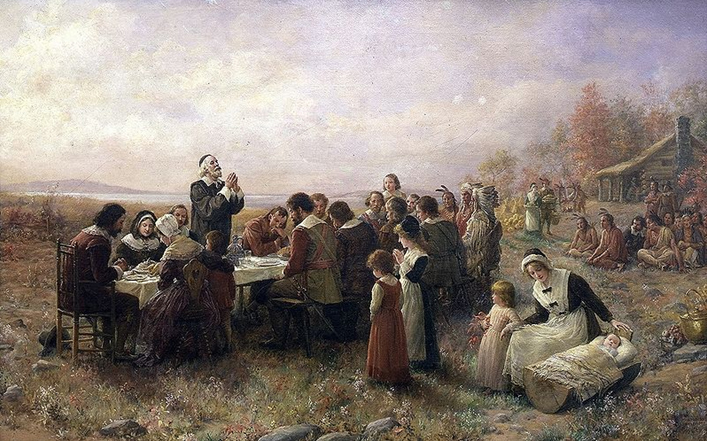
The First Thanksgiving at Plymouth.
By Jennie A. Brownscombe. (1914).
- Bookmark :
- Digg
- del.icio.us
- Stumbleupon
- Redit it
- Posted by - (0) Comment
NEW YORK TIMES:
Vilnius among the 10
hippest world cities!

Vilnius early this morning, Sunday 20 November 2011.
Youngsters lighting candles at the Cathedral
to mourn people killed in traffic accidences.
Photo: Aage Myhre
“Hip cities that think about how they work. The story of young people, full of ambition, energy, skill and talent, moving to enticing cities that call to them like a siren’s song is as old as modern civilization. And in a world where national borders are easier to traverse, where more countries are joining the prosperous global middle class and where the cost of a one-way plane ticket is more affordable, young professionals probably have more cities to choose from than ever before.”
This is how New York Times this week introduces its article about what they consider the 10 hippest cities in the world. Vilnius being one of them.
Click here to read the New York Times article
![]()
“The corrupt neoliberal mayor of Vilnius managed to brainwash even New York Times”

Vilnius Mayor, Arturas Zuokas crushing
an illegally parked car with an armed
vehicle from the Lithuanian army.
Not everyone is impressed by the New York Times’ selection of Vilnius among the top ten hip cities in the world. Here are two comments from Facebook this morning:
1) “My dislike for Vilnius aside, this kind of publicity is very important and would be valuable, if only different aspects were stressed and many of the statements weren't propaganda”
2) “Oh come on, this Zuokas' neoliberalism is way overrated while his public relations drive is closer to idiocy than propaganda. I happened to get in touch with some of his apparatchiks with the city hall's PR and press offices; I'm telling you, they could barely qualify to work for a kolkhoz. The dude is very funny for an ex-convict though, a good journalistic back scratch.”
![]()
Here is MY Vilnius – of today:

Aage Myhre,
Editor-in-Chief.
I took to the streets of Vilnius early today morning, Sunday 20 November.
It was a mysterious, misty morning, excellent for photographing. If you want to see a slide show of my early morning impressions, simply click on one of the below images:
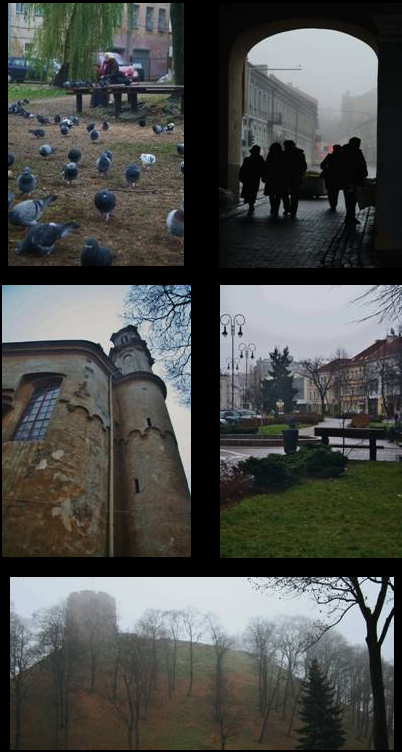
Click here to see my misty early Sunday morning slide show.
- Bookmark :
- Digg
- del.icio.us
- Stumbleupon
- Redit it
- Posted by - (6) Comment
The power of words
This short film illustrates the power of words to radically change your message and your effect upon the world.
Homage to Historia de un letrero, The Story of a Sign by Alonso Alvarez Barreda Music by: Giles Lamb http://www.gileslamb.com Filmed by www.redsnappa.com Director Seth Gardner. Cast: Bill Thompson, Beth Miller http://www.uk.castingcallpro.com/view.php?uid=217905
VilNews: Almost 200,000 visitors in only nine months!
Speaking of the word power: Our VilNews e-magazine has now been online for nine months. When we started the experts said that we probably would reach a readership of around 10 to 15,000 per year. It is therefore with great pleasure we can reveal that we already are approaching 200,000 visits, an incredibly large and gratifying number! We thank you, dear readers, for the enormous interest you are showing VilNews every single day!
- Bookmark :
- Digg
- del.icio.us
- Stumbleupon
- Redit it
- Posted by - (0) Comment
How I came to Lithuania 21 years ago (6 of 6)
Some private memories by Aage Myhre, VilNews Editor-in-Chief
aage.myhre@VilNews.com
1991: Oslo and Vilnius
become twin cities

21 January 1991. Soviet military vehicles dominate the streets of Vilnius. Dag Andersen and the author conveys a letter from Oslo, signed by Mayor Michael Tetzschner. Oslo offers Vilnius to become its first friendship city in the West. The letter was enthusiastically received by the Vilnius Mayor Arunas Grumadas and Deputy Mayor Regimantas Ciupaila.
Facsimile: Aftenposten, Norway.
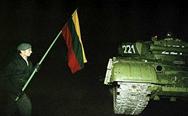 |
Heavy tanks were used by the Soviet forces when they attacked the TV tower and the Parliament building in Vilnius on 13 January 1991 (left). They were met by a wall of unarmed people who refused to allow the intruders to again take control of their homeland. Inside the city they used armoured vehicles on rubber wheels (below). | ||
| It was a bizarre, almost surreal experience to always be spotting, hearing the noise, feel the ground tremble when we were in meetings or trying to get a meal in one of the city's few restaurants. | |||
We often did our eating and drinking in Hotel Lietuva, in the so-called 'Black Bar', where only western, hard currency was accepted. This bar was the centre for international media those January days. Every night we heard stories about howtelevision crews and journalists had experienced rather harsh confrontations with Soviet military units. |
|
||
We were two Norwegians working very much with Lithuanian affairs at this time, Dag Andersen and me. During our visit to Vilnius in January 1991, we brought with us a letter from the city council leader in Oslo, inviting the mayor of Vilnius to sign a sister city agreement. We handed the letter over to Mayor Arunas Grumadas on 21 January while Soviet troops were standing around in the streets and armoured vehicles roaring around us.
The twin city agreement was signed a few months later, and Oslo became the first Western city to enter into such an agreement with Vilnius. I see it as an important symbol of friendship and solidarity at a difficult time for a country under tremendous pressure and terrible abuse from their neighbour to the east.
During 1991 I came back to Lithuania several times. I saw more, understood more. The country began in earnest to fascinate me. I was also in Vilnius during the failed coup in Moscow in August 1991, again thrilling days. On the morning of 30 August 1991 I was probably the first person in modern times that got a legal visa directly to the nation of Lithuania, stamped into my Norwegian passport. 30 August 1991 was the day when the Lithuanian migration authorities finally could do so in accordance with international rules. The Soviet Union was finally a horror of the past. Also formally, Lithuania was once again a free and independent country.
50 years of oppression was over!

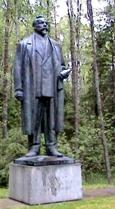
|
ABOVE: During my first visit to Lithuania, in November 1990, I took this picture at Rotušes Square (Town Hall Square) in Vilnius. This was probably the very last picture ever made of the statue of Vincas Mickevičius-Kapsukas. Next morning he had been knocked down by local activists... |
Vincas Mickevičius-Kapsukas was a communist leader, born 1880 in Būdviečiai, Vilkaviškis district, dead 1935 in Moscow. He was a political activist, fighting Tsar Russia, one of the founders and leaders of the Communist Party of Lithuania and the Lithuanian Soviet Socialist Republic (1918–1919).
After the WWII Soviet occupation of Lithuania, his student Antanas Sniečkus (see our article https://vilnews.com/?p=6598 ) propagated Mickevičius' personality cult. In his honour the city of Marijampolė was renamed Kapsukas (1956–1989) and Vilnius University (1955–1990) bore his name. Two large sculptures of Mickevičius were erected in Vilnius: one here, in front of the Vilnius Town Hall (1962) and another, depicting Mickevičius with Lenin, in Antakalnis (1979).

- Bookmark :
- Digg
- del.icio.us
- Stumbleupon
- Redit it
- Posted by - (5) Comment
How I came to Lithuania 21 years ago (6 of 6)
Some private memories by Aage Myhre, VilNews Editor-in-Chief
aage.myhre@VilNews.com
1991: Oslo and Vilnius
become twin cities

21 January 1991. Soviet military vehicles dominate the streets of Vilnius. Dag Andersen and the author conveys a letter from Oslo, signed by Mayor Michael Tetzschner. Oslo offers Vilnius to become its first friendship city in the West. The letter was enthusiastically received by the Vilnius Mayor Arunas Grumadas and Deputy Mayor Regimantas Ciupaila.
Facsimile: Aftenposten, Norway.
|
|
Heavy tanks were used by the Soviet forces when they attacked the TV tower and the Parliament building in Vilnius on 13 January 1991 (left). They were met by a wall of unarmed people who refused to allow the intruders to again take control of their homeland. Inside the city they used armoured vehicles on rubber wheels (below). It was a bizarre, almost surreal experience to always be spotting, hearing the noise, feel the ground tremble when we were in meetings or trying to get a meal in one of the city's few restaurants. |
|
|
|
We often did our eating and drinking in Hotel Lietuva, in the so-called 'Black Bar', where only western, hard currency was accepted. This bar was the centre for international media those January days. Every night we heard stories about how television crews and journalists had experienced rather harsh confrontations with the Soviet military units. |
|
||
We were two Norwegians working very much with Lithuanian affairs at this time, Dag Andersen and me. During our visit to Vilnius in January 1991, we brought with us a letter from the city council leader in Oslo, inviting the mayor of Vilnius to sign a sister city agreement. We handed the letter over to Mayor Arunas Grumadas on 21 January while Soviet troops were standing around in the streets and armoured vehicles roaring around us.
The twin city agreement was signed a few months later, and Oslo became the first Western city to enter into such an agreement with Vilnius. I see it as an important symbol of friendship and solidarity at a difficult time for a country under tremendous pressure and terrible abuse from their neighbour to the east.
During 1991 I came back to Lithuania several times. I saw more, understood more. The country began in earnest to fascinate me. I was also in Vilnius during the failed coup in Moscow in August 1991, again thrilling days. On the morning of 30 August 1991 I was probably the first person in modern times that got a legal visa directly to the nation of Lithuania, stamped into my Norwegian passport. 30 August 1991 was the day when the Lithuanian migration authorities finally could do so in accordance with international rules. The Soviet Union was finally a horror of the past. Also formally, Lithuania was once again a free and independent country.
50 years of oppression was over!

|
|
ABOVE: During my first visit to Lithuania, in November 1990, I took this picture at Rotušes Square (Town Hall Square) in Vilnius. This was probably the very last picture ever made of the statue of Vincas Mickevičius-Kapsukas. Next morning he had been knocked down by local activists... After the WWII Soviet occupation of Lithuania, his student Antanas Sniečkus (see our article https://vilnews.com/?p=6598 ) propagated Mickevičius' personality cult. In his honour the city of Marijampolė was renamed Kapsukas (1956–1989) and Vilnius University (1955–1990) bore his name. Two large sculptures of Mickevičius were erected in Vilnius: one here, in front of the Vilnius Town Hall (1962) and another, depicting Mickevičius with Lenin, in Antakalnis (1979). LEFT: You can today find the statue of Mickevičius-Kapsukas in the Grutas Park in Southern Lithuania. The park is the repository of old Soviet era statues and artefacts that were removed from public places when Soviet occupation of Lithuania ended. |

How I came to Lithuania 21 years ago (6 of 6)
Some private memories by Aage Myhre, VilNews Editor-in-Chief
aage.myhre@VilNews.com
- Bookmark :
- Digg
- del.icio.us
- Stumbleupon
- Redit it
VilNews e-magazine is published in Vilnius, Lithuania. Editor-in-Chief: Mr. Aage Myhre. Inquires to the editors: editor@VilNews.com.
Code of Ethics: See Section 2 – about VilNews. VilNews is not responsible for content on external links/web pages.
HOW TO ADVERTISE IN VILNEWS.
All content is copyrighted © 2011. UAB ‘VilNews’.

 Click on the buttons to open and read each of VilNews' 18 sub-sections
Click on the buttons to open and read each of VilNews' 18 sub-sections 




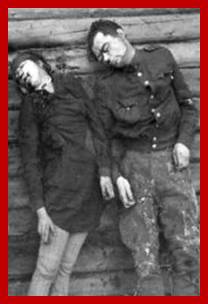
















.jpg)



